
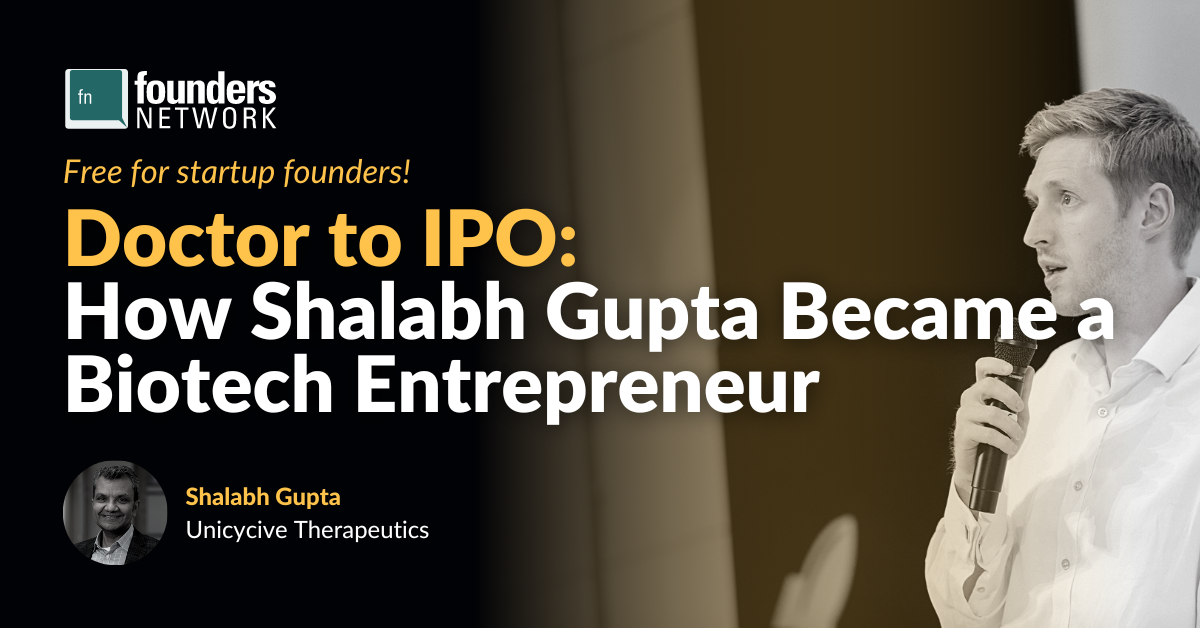

- This event has passed.
December 15, 2022 @ 9:30 am - 11:30 am PST
FreeDoctor to IPO: How Shalabh Gupta Became a Biotech Entrepreneur
Dr. Shalabh Gupta’s journey to becoming a founder started at New York University Medical Center. He quickly learned that to maximize his impact on the medical field, he would have to ditch the white coat.
“Physicians can have one patient at a time,” Gupta says. “Perhaps in a given year, they can visit a couple thousand patients. And I felt that technology allows us and me to be able to be part of something that can affect hundreds of thousands of people and perhaps millions of people.”
Gupta used his medical background to found Globavir – which develops diagnostics for dengue and small molecule drugs for treating cancer – in 2011 and Unicycive – which creates treatments for rare kidney conditions – in 2016. Globavir announced a licensing agreement with Bio-Rad in 2016, and Unicycive went public in 2021.
On Dec. 15, Gupta will host a webinar for Founders Network members where he will share insights into his transition from the hospital to creating impactful biomedical technology.
During his webinar, he will also discuss:
-
- The importance of a medical perspective in biotech
- Measuring success for biotech products
- Lessons from the growth of Genentech
- How to create mission-based company culture
- Building a biotech startup team
Opening Remarks @ 9:30am PT
Join us for opening remarks with Kevin Holmes, Founder & CEO @ Founders Network, to get the latest updates from the Network and opportunities for getting involved.
Keynote Speaker @ 9:40am PT
Shalabh Gupta, MD, is the founder of Unicycive and has served as Chief Executive Officer, President, and director since August 2016. Previously, Dr. Gupta served in various other roles, including founder and Chief Executive Officer of Biocycive Inc.; a commercial strategy role at Genentech, Inc.; equity research covering US pharmaceutical companies at UBS Investment Bank; and as an equity research role covering biotechnology companies at Rodman & Renshaw (currently HC Wainwright). Dr. Gupta previously served as a medical advisor to Synageva BioPharma Corporation and as an advisor to New York University (NYU) Langone Medical Center’s Office of Technology Transfer. Dr. Gupta is also the founder and Chief Executive Officer of Globavir, a company with a diagnostic platform technology licensed from Stanford University, which was partnered with Bio-Rad (NASDAQ: BIO) in 2016 and later with Cepheid (now part of Danaher Corporation, NYSE: DHR). Bio-Rad currently sells this technology as part of their RUO (Research Use Only) kits and Danaher is advancing diagnostic technology through the regulatory approval process throughout the world.
Dr. Gupta is an advisor to the UCSF Innovation Center, a role he has held since 2020. Since 2012, Dr. Gupta has also been an advisor to SPARK, Stanford University School of Medicine. Dr. Gupta previously served on the board of directors of the Beall Center for Innovation and Entrepreneurship at the University of California Irvine, Paul Merage School of Business. Before his roles in business and finance, Dr. Gupta was an attending physician at New York University (“NYU”) Medical Center and a clinical faculty member at the NYU School of Medicine. Dr. Gupta was a board-certified physician, and he currently holds a license from the California State Medical Board.
Dr. Gupta completed his internship in Internal Medicine, medical residency in Physical Medicine and Rehabilitation, and research fellowship in Cardiopulmonary Rehabilitation at NYU School of Medicine. Dr. Gupta received his MPA in Health Care Finance and Management from NYU’s Robert F. Wagner Graduate School of Public Service and his MD from Jawaharlal Institute of Postgraduate Medical Education & Research, India.
Dr. Gupta has been in several leadership roles throughout his academic and professional career. He was elected president of the Resident Physicians Council, representing approximately 1,500 resident physicians in physical medicine and rehabilitation across the US during his residency training. He was also elected to the Board of Directors at the Wagner Alumni Association.
Stage-Based Roundtables @ 10:30 am PT
Complimentary Ticket:
Are you a full-time tech founder? Be our guest! We’re making our events available to tech founders everywhere. Enjoy a complimentary ticket to come learn from fellow tech founders, partners and investors. Already used your complimentary guest pass? Request an invite to see if you qualify for membership.
About Founders Network:
Founded in 2011, Founders Network offers lifelong peer mentorship to over 600 tech startup founders globally. Our platform, programs and high-touch service facilitate authentic experience sharing, warm introductions and long-term professional relationships. Additional benefits include over $500k in startup discounts and promotion to 2,000 newsletter readers. Members are located in San Francisco, New York City, Los Angeles, Vancouver, Toronto, London and other tech hubs. Each month our Membership Committee admits a new cohort of full-time tech founders who are nominated by an existing member. Learn more about us here
Confidentiality Policy
All information shared within Founders Network is strictly confidential. We are built on a foundation of trust, and the community takes confidentiality seriously. Investors, members, and staff all share experiences and opinions off the record. In this roundtable forum, we continue to model our fnValues of Reciprocity, Humility, Authenticity and Inclusivity. Read more about our Privacy Policy here.
Testimonials
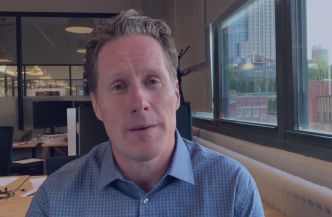
"If you don't have a cohort group in something like Founders Network that you can develop long-term relationships with and discuss the same topics that come up with people that you already know, you're probably missing out on something very important."David Plonsky
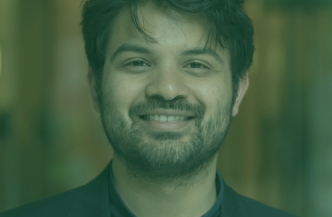
"The number one advantage is the law of compound interest. The longer you stay in a very high-quality network the strong and more authentic relationships you build."Chaitanya Vaidya

"We know each other's business and we know each other's struggles. Having a personal relationship with other founders that is completely confidential and completely authentic gives you a lot of great advice."Doug Lessing

"FN manages my network for me by connecting me with other founders in my specific industry sector. I've been able to explore business development opportunities, partnerships, etc."Becky Splitt
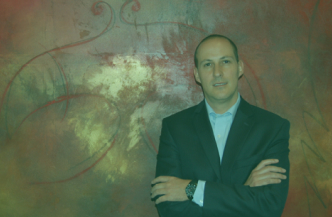
"We just saw the first Mexican unicorn come to life this same week which is a fantastic idea. Being part of the Founders Network makes a lot of sense. We see that the Mexico City chapter is growing substantially."Max Linares

"There's a lot of great stuff going on even now in San Francisco. I've found Founders Network has been a great resource for me and for all of the founders I know during these tough times."Jarie Bolander

"It allowed me to meet people who had done this before that had the experience. I was able to explain an issue very briefly and they were able to give me a very detailed response on how they addressed it."Terence Finn

"I've used the platform to discover advice, connections, resources, discounts, on important services, connections to investors, and practice on how to pitch. The kind of conversations you can't get anywhere else on youtube or google searches."Alexandra Greenhill
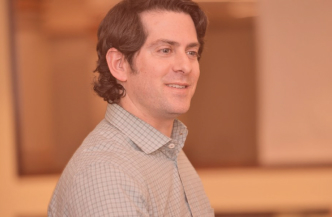
"I see Founders Network as one of those necessary resources in the Chicagoland area."Jason Jacobsohn

"The Black Founders initiative allows me to shape this program where we can inspire, engage, and support Black Founders."Khiry Kemp

